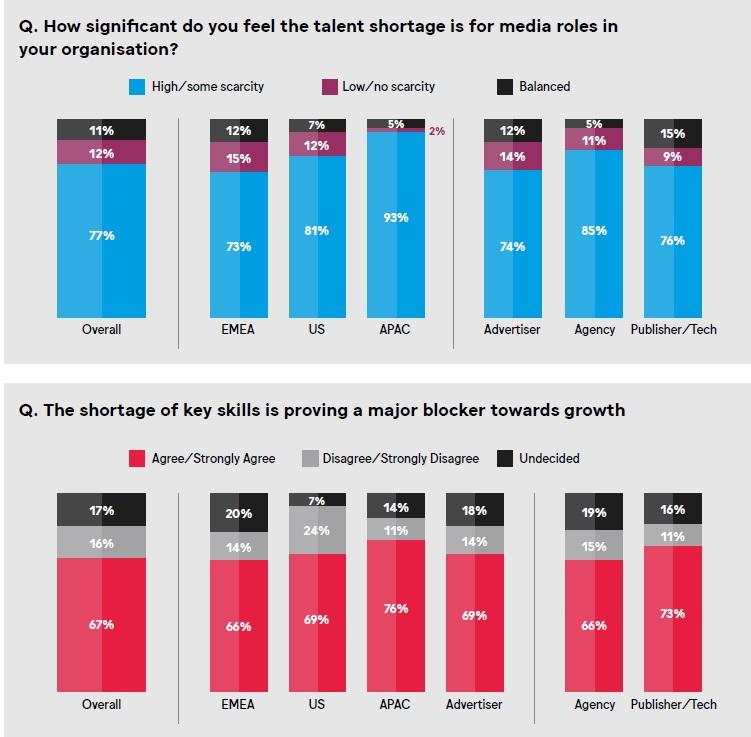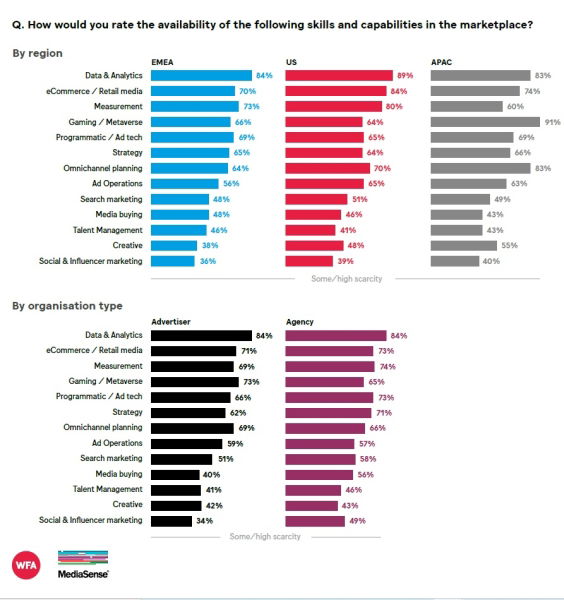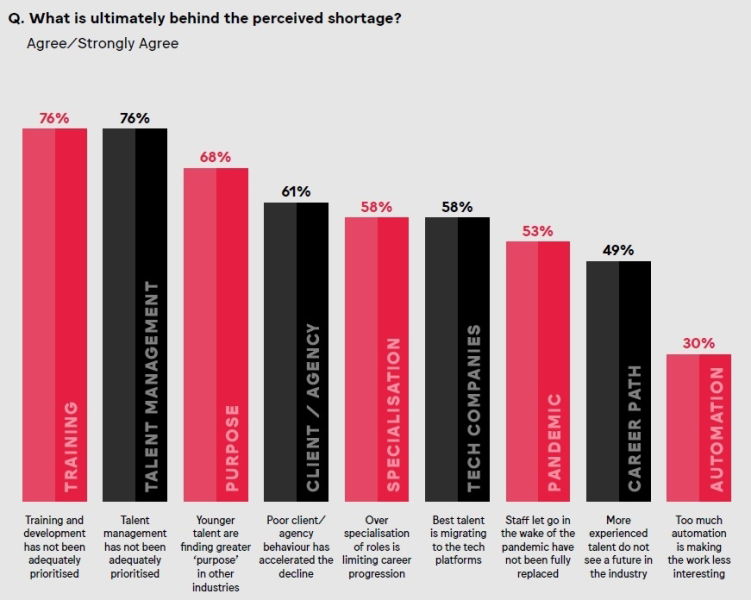
APAC ad ecosystem blames lack of talent for growth block
share on
Approximately, 76% of advertisers, agencies, ad tech companies and media owners in APAC say that talent scarcity is proving to be a major blocker to growth.
According to a report by WFA titled “Media’s Got Talent?”, on the global level nearly half (48%) of the respondents say that they are facing the “worst-ever crisis” when it comes to talent. Around 68% globally say that the talk of a “crisis” is not overstating the matter, and 77% of respondents admitted that there is “some” or “high” scarcity of talent in their organisation, peaking at 85% among the agency and ad tech sectors, and at 93% in APAC.
The key areas of talent shortage were in data and analytics (84% at both advertisers and agencies), eCommerce/retail media (71% at advertisers and 73% at agencies and measurement (69% at advertisers and 74% at agencies). Data and analytics were also highlighted as the single most important capability to prioritise for the next two years, with 71% of advertiser and 64% of agencies agreeing, significantly ahead of eCommerce/Retail media at 53% and 42% respectively.

Across all regions and industry cohorts, the more arts-based disciplines of media buying, social media, influencer marketing and creative are better supplied. For example, only 36% of respondents are seeing scarcity in social and influencer marketing in EMEA. Similarly, disciplines which can be more easily automated or handled via offshoring – such as ad operations or search marketing – are also experiencing less scarcity.

“The talent crisis is affecting all parts of the industry and clients are feeling the pinch within their internal global media teams,” said Matt Green, director, global media services at WFA. However, the research shows, the impact is particularly pronounced on the agency side and this is having a profound impact on the ability of clients to execute campaigns globally.
“While the industry couldn’t have predicted a global pandemic, this study also identifies intractable, but more predictable issues, that have had a dramatic impact including training, talent management and even a perceived lack of purpose. These factors need to be addressed for the health of all our businesses and in the interest of a stronger client and agency dynamic” Green added.
What’s causing the shortage?
The factors being blamed for the skills shortage include poor training, talent management (both 76%), a lack of purpose (68%), poor client agency behaviour (61%) and over specialisation and recruitment by tech companies (both 58%). This latter factor, with tech companies able to offer a different pace of work, alongside more attractive and motivating remuneration is most pronounced in the US (69% vs 52% in EMEA and 59% in APAC).
Advertisers are most affected by the tech-steal with 64% of advertisers compared to 49% of agencies agreeing that this is a major contributor to the talent shortage.

Silo thinking and ‘over-specialisation’ of roles are also factors that are limiting the quality and breadth of advice being given, and the scope of employee learning. Around 71% of advertiser respondents agree or strongly agree that this is limiting career progression. This is understandable as advertisers typically seek more rounded, commercially minded marketers, over more specialist, siloed thinking.
Burnout is also a key factor behind talent shortage. Around 76% of respondents think that readdressing the work/life balance would have a significant impact. Investing more in internal talent management (also 76%), greater flexibility about how and where people work (73%) and greater clarity around career progression (72%).
Improved salary and benefits were cited by 61%.
Last but not least, flexibility has become key for many businesses seeking to attract and retain talent, with those harking back to pre-COVID times being met with very disgruntled employees. According to the study, it is now simply an expectation – particularly with the cost-of-living crisis – that employees will determine how they want to work, rather than have this determined by organisations.
“This study comes at an important time in the industry with businesses experiencing levels of staff attrition never seen before. And while we remain first and foremost a people-centric business, ‘riding the wave’ is no longer a viable strategy. We know the impact this has on future growth, so it is vital that businesses start to invest in talent in a more meaningful way, ensuring they strike a better balance between specialists and all-rounders, youth and experience, expertise and attitude,” said Ryan Kangisser, managing partner at MediaSense.
In the largest study of its kind, the findings are based on responses from more than 400 stakeholders from many of the world’s largest advertisers, agencies, media platforms and technology companies. Eighty-one percent of respondents were at director level with advertiser respondents responsible for in excess of $110 billion in annual communications spend.
Related Articles:
L'Oréal names marketing director for SG and MY post combination of ops
Why Singtel sold digital marketing unit Amobee to Tremor for US$239m
A comprehensive list of salaries for those in the marketing industry
RICE Media names new MD, restructures to ready for regional expansion
share on
Free newsletter
Get the daily lowdown on Asia's top marketing stories.
We break down the big and messy topics of the day so you're updated on the most important developments in Asia's marketing development – for free.
subscribe now open in new window
